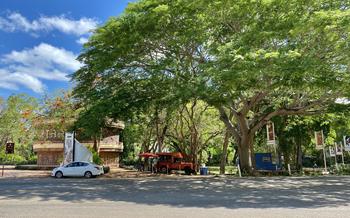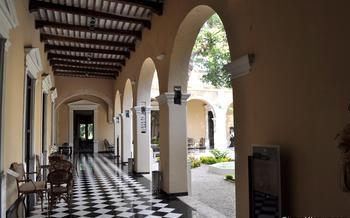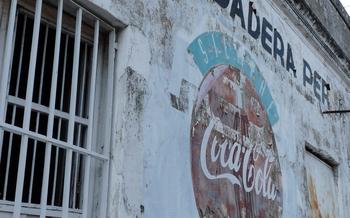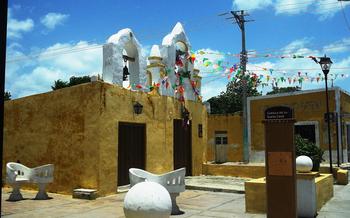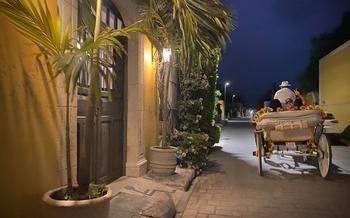
Archivo General del Estado de Yucatán
- Unveiling the Past: Exploring the Collections
- Tracing Ancestral Roots: Genealogy Research
- Uncovering the Independence Movement: Revolutionary Archives
- Exploring the Porfirio Díaz Era: Economic and Social Transformation
- Witnessing the Mexican Revolution: Revolutionary Archives
- Post-Revolutionary Yucatán: Reconstruction and Development
- Glimpsing into Everyday Life: Personal Archives
- Documenting the Maya: Indigenous Archives
- Preserving Yucatán's Heritage: Conservation Efforts
- Researching Yucatán's History: Tips for Visitors
- Educational Programs and Workshops
- Insider Tip: Unveiling Hidden Gems
Unveiling the Past: Exploring the Collections
The Archivo General del Estado de Yucatán holds a vast and diverse range of collections, spanning from the colonial era to modern times. These collections include:
-
Colonial Documents: These documents date from the 16th to the 19th centuries and provide insights into the Spanish colonial administration, the lives of conquistadors and missionaries, and the interactions between Spanish and Maya cultures.
-
Revolutionary Archives: These collections contain documents related to Yucatán's independence from Spain and the Mexican Revolution. They include correspondence, manifestos, and other materials that shed light on the political and social struggles of these periods.
-
Porfirio Díaz Era Documents: This collection includes documents from the era of President Porfirio Díaz (1876-1911), a period of significant economic development and social transformation in Yucatán.
-
Post-Revolutionary Yucatán Archives: These documents document the efforts to rebuild the state after the Mexican Revolution, including agrarian reform, social welfare programs, and political developments.
-
Personal Archives: The archive also holds personal archives, such as diaries, letters, and photographs, which offer glimpses into the lives of ordinary Yucatecans from different eras.
-
Maya Archives: These collections include documents related to the Maya people of Yucatán, such as land titles, legal disputes, and records of Maya communities.
Among the highlights of the archive are rare manuscripts, such as the "Crónica de la conquista de Yucatán" by Friar Diego de Landa, which provides a detailed account of the Spanish conquest of the region. The archive also holds a collection of historical maps and plans of Yucatán cities, offering a visual representation of the state's urban development over time.
These collections offer a wealth of information for researchers, historians, genealogists, and anyone interested in exploring the rich and complex history of Yucatán.
Tracing Ancestral Roots: Genealogy Research
The Archivo General del Estado de Yucatán is a treasure trove for genealogists seeking to trace their family history in Yucatán. The archive holds a vast collection of genealogical resources, including birth, marriage, and death records; census data; land grants; wills; and other legal documents. These records span from the colonial period to the present day, providing a rich source of information for researchers.
To begin your genealogical research at the archive, it is helpful to have some basic information about your ancestors, such as their names, birth dates, and places of origin. The staff at the archive can assist you in locating relevant documents and provide guidance on how to interpret the records.
Several success stories have emerged from researchers who have used the archive to trace their roots in Yucatán. One researcher, for example, was able to trace his family back to the 16th century, discovering that his ancestors were among the first Spanish settlers in the region. Another researcher found documents that revealed her family's involvement in the Yucatán independence movement.
Genealogical research at the Archivo General can be challenging, as the records are often handwritten and in Spanish or Maya. However, the rewards of uncovering your family's history can be immense. With patience and perseverance, you may be able to piece together the story of your ancestors' lives and their contributions to the rich history of Yucatán.
Uncovering the Independence Movement: Revolutionary Archives
The Archivo General del Estado de Yucatán holds a wealth of documents related to Yucatán's independence from Spain. This collection includes correspondence between local leaders and the Spanish authorities, manifestos and proclamations calling for independence, and other revolutionary materials.
These documents provide invaluable insights into the motivations and strategies of the Yucatán independence movement. They reveal the challenges faced by the Yucatecan rebels, including the lack of military resources and the divisions within the independence camp. They also shed light on the role of key figures in the movement, such as Santiago Imán and Andrés Quintana Roo.
The archive also houses biographies of prominent Yucatecan revolutionaries, offering personal accounts of their experiences and sacrifices. These biographies provide a glimpse into the lives of the men and women who fought for Yucatán's independence, their hopes and fears, and their ultimate legacy.
The documents related to the Yucatán independence movement are essential for understanding this pivotal period in the state's history. They offer a rich tapestry of voices and perspectives, allowing researchers and historians to reconstruct the events of the independence struggle and its impact on Yucatán's society and politics.
Exploring the Porfirio Díaz Era: Economic and Social Transformation
During the Porfirio Díaz era (1876-1911), Mexico experienced significant economic and social changes. The Archivo General del Estado de Yucatán holds a wealth of documents that shed light on this transformative period in Yucatán's history.
Economic development was a key focus of the Díaz regime. Documents from this era reveal the influx of foreign investment, particularly in the henequen industry. The henequen plant, native to Yucatán, was used to produce a strong fiber for making rope and twine. The expansion of the henequen industry led to the growth of haciendas, large agricultural estates, and the rise of a wealthy elite.
The Díaz era also saw the development of infrastructure, including railroads and telegraph lines, which connected Yucatán to the rest of Mexico and facilitated trade. The construction of ports and roads improved transportation and communication, boosting economic activity.
Social changes were also taking place during this period. The Díaz regime implemented educational reforms, expanding access to education and promoting literacy. Healthcare and labor rights were also addressed, with the establishment of hospitals and labor laws.
Politically, the Díaz era was characterized by authoritarian rule. Díaz maintained control through a system of patronage and repression. However, his regime also brought stability and order to the country after decades of turmoil.
The Archivo General del Estado de Yucatán houses a rich collection of documents from the Porfirio Díaz era, providing valuable insights into the economic, social, and political transformation that took place during this period.
Witnessing the Mexican Revolution: Revolutionary Archives
The Archivo General del Estado de Yucatán holds a wealth of documents related to the Mexican Revolution (1910-1920), a tumultuous period that transformed Mexico's political and social landscape. These archives offer a glimpse into the events that unfolded in Yucatán during this era, providing valuable insights into the struggles, alliances, and social upheaval that shaped the state's history.
Among the highlights of the revolutionary archives are accounts of battles, political alliances, and social unrest in Yucatán. Researchers can explore correspondence, manifestos, and other materials that shed light on the strategies and motivations of revolutionary leaders, such as Felipe Carrillo Puerto, who played a pivotal role in Yucatán's revolutionary movement.
The archives also contain biographies of key figures in the independence movement, providing personal insights into the lives and contributions of those who fought for Yucatán's freedom from Spain. These documents reveal the challenges and sacrifices faced by the revolutionaries, as well as their hopes and aspirations for a more just and equitable society.
The impact of the revolution on Yucatán's society and politics is also documented in the archives. Researchers can examine records of land redistribution, labor reforms, and educational initiatives that were implemented during this period. These documents provide a glimpse into the social and economic transformation that took place in Yucatán in the aftermath of the revolution.
Post-Revolutionary Yucatán: Reconstruction and Development
The post-revolutionary period in Yucatán (1920-1940) was a time of reconstruction and development. The state had been devastated by the Mexican Revolution, and the new government faced the challenge of rebuilding infrastructure, restoring the economy, and addressing social issues.
Documents from this period shed light on the efforts to rebuild the state. They include records of government programs, such as agrarian reform and social welfare programs, which aimed to improve the lives of the Yucatecan people. These documents also provide insights into the political and cultural developments of the era, including the rise of new political parties and the emergence of a new cultural identity in Yucatán.
One of the most significant achievements of the post-revolutionary period was the implementation of agrarian reform. The government distributed land to landless peasants, which helped to improve the lives of many rural families. Documents from the Archivo General del Estado de Yucatán provide detailed information about the process of land distribution, including the names of the beneficiaries and the size of the land plots they received.
Another important aspect of the post-revolutionary period was the development of social welfare programs. The government established schools, hospitals, and other social services to improve the lives of the Yucatecan people. Documents from the archive provide information about these programs, including the number of people they served and the types of services they provided.
The post-revolutionary period was also a time of political and cultural change in Yucatán. New political parties emerged, and the state's cultural identity began to evolve. Documents from the archive provide insights into these changes, including the platforms of the new political parties and the emergence of new cultural expressions, such as literature and music.
Glimpsing into Everyday Life: Personal Archives
Beyond the official records and historical documents, the Archivo General del Estado de Yucatán also houses a treasure trove of personal archives that offer a unique glimpse into the lives of ordinary Yucatecans from different eras. These personal archives include diaries, letters, photographs, and other documents that provide intimate insights into the joys, sorrows, struggles, and triumphs of individuals and families.
Through these personal archives, researchers can uncover stories of love, loss, family, and community that shed light on the everyday experiences of people from all walks of life. They can delve into the lives of merchants, farmers, artisans, teachers, and housewives, gaining a deeper understanding of the social, cultural, and economic realities of Yucatán's past.
One of the most fascinating aspects of these personal archives is their ability to humanize historical events. By reading the letters of a young woman during the Mexican Revolution or examining the photographs of a family celebrating a wedding in the early 20th century, researchers can connect with the past on a personal level and gain a deeper appreciation for the lives of those who came before them.
The Archivo General del Estado de Yucatán recognizes the importance of preserving and sharing these personal histories. The archive staff is dedicated to collecting, cataloging, and digitizing these documents to ensure that they are accessible to researchers and the general public. By doing so, the archive helps to preserve the collective memory of Yucatán and to connect people with their ancestral roots.
Documenting the Maya: Indigenous Archives
The Archivo General del Estado These documents provide invaluable insights into the history, culture, and struggles of the Maya people from the colonial era to the present day.
Among the most important Maya-related documents in the archive are land titles, which provide a glimpse into the land tenure system of the Maya and the ways in which their lands were encroached upon by Spanish colonists. Legal disputes between Maya communities and Spanish landowners are also documented, shedding light on the legal challenges faced by the Maya in defending their rights.
The archive also holds a collection of Maya language documents, including codices, dictionaries, and grammars. These documents are crucial for understanding the Maya language and culture, and for preserving the linguistic heritage of the Maya people.
In addition to written documents, the archive also houses a collection of Maya artifacts, such as pottery, textiles, and tools. These artifacts provide a tangible connection to the Maya past and help to illustrate the daily lives of the Maya people.
The Archivo General del Estado de Yucatán is committed to preserving and promoting the documentary heritage of the Maya people. Through its collections, exhibitions, and educational programs, the archive is helping to ensure that the history and culture of the Maya people are not forgotten.
Preserving Yucatán's Heritage: Conservation Efforts
The Archivo General del Estado de Yucatán is dedicated to preserving and protecting the historical documents in its care. A team of conservators works tirelessly to restore and maintain the fragile records, using specialized techniques and materials. Digitization projects are also underway to make the collections more accessible to researchers and the general public. However, preserving historical records in a tropical climate poses unique challenges. High humidity and fluctuating temperatures can damage documents, making it essential to control the environment in the archive's storage facilities. The Archivo General also faces the challenge of limited resources, as funding for conservation efforts is often scarce. Despite these challenges, the staff is committed to preserving Yucatán's documentary heritage for future generations.
Researching Yucatán's History: Tips for Visitors
To make the most of your research trip to the Archivo General del Estado de Yucatán, here are some practical tips:
-
Plan your visit: Before your trip, contact the archive to confirm their hours of operation and any special requirements for accessing the collections. It's advisable to book an appointment with a researcher or archivist who can guide you through the process.
-
Gather your materials: Bring along any relevant documents or information you have about your research topic. This may include family records, historical maps, or previous research findings.
-
Navigating the collections: Once at the archive, ask the staff for assistance in locating the collections relevant to your research. They can provide guidance on using the catalog, finding specific documents, and making copies.
-
Language proficiency: If you're not fluent in Spanish or Maya, consider hiring a translator or interpreter to help you navigate the collections and communicate with the staff.
-
Recommended resources: The archive offers a variety of resources to aid your research, including guides, catalogs, and online databases. Ask the staff for recommendations and assistance in finding the right resources for your topic.
Educational Programs and Workshops
The Archivo General del Estado de Yucatán offers a range of educational programs and workshops to engage students, researchers, and the general public with the state's rich history. These programs provide opportunities for individuals to delve deeper into Yucatán's past, learn about archival research methods, and explore specific historical topics.
Workshops on archival research techniques and genealogy are particularly popular, empowering participants to conduct their own research and trace their family roots. Specialized courses on various aspects of Yucatán's history are also offered, catering to the interests of students and researchers.
The archive's educational programs are designed to foster a deeper understanding and appreciation of Yucatán's heritage. Through lectures, seminars, and hands-on workshops, participants gain valuable insights into the historical processes that have shaped the state.
These programs not only contribute to the preservation and dissemination of Yucatán's history but also create a vibrant space for cultural exchange and dialogue. Researchers, students, and community members come together to share their knowledge, experiences, and perspectives, fostering a sense of collective ownership and pride in Yucatán's rich historical legacy.
Insider Tip: Unveiling Hidden Gems
One of the best ways to make the most of your visit to the Archivo General del Estado de Yucatán is to ask the staff about lesser-known collections or hidden gems. They can point you to documents or records that may not be immediately apparent but could be highly relevant to your research or interests. The archive staff is knowledgeable and passionate about Yucatán's history, and they are always happy to assist researchers in their quest for information.
Beyond the archive itself, take the time to explore the surrounding area, which is rich in historical landmarks and museums. The city of Mérida is a treasure trove of colonial architecture, vibrant culture, and delicious cuisine. Immerse yourself in the local culture by visiting markets, trying traditional Yucatecan dishes, and attending cultural events. Combine your archival research with a cultural journey to fully appreciate the rich history and heritage of Yucatán.
For those seeking recommendations on where to eat, stay, and explore in Mérida, the archive staff can provide valuable insights. They can suggest local restaurants serving authentic Yucatecan cuisine, recommend comfortable and affordable accommodations, and point you to must-see attractions and hidden gems. Embrace the opportunity to engage with the local community and create a truly memorable experience in Mérida.
